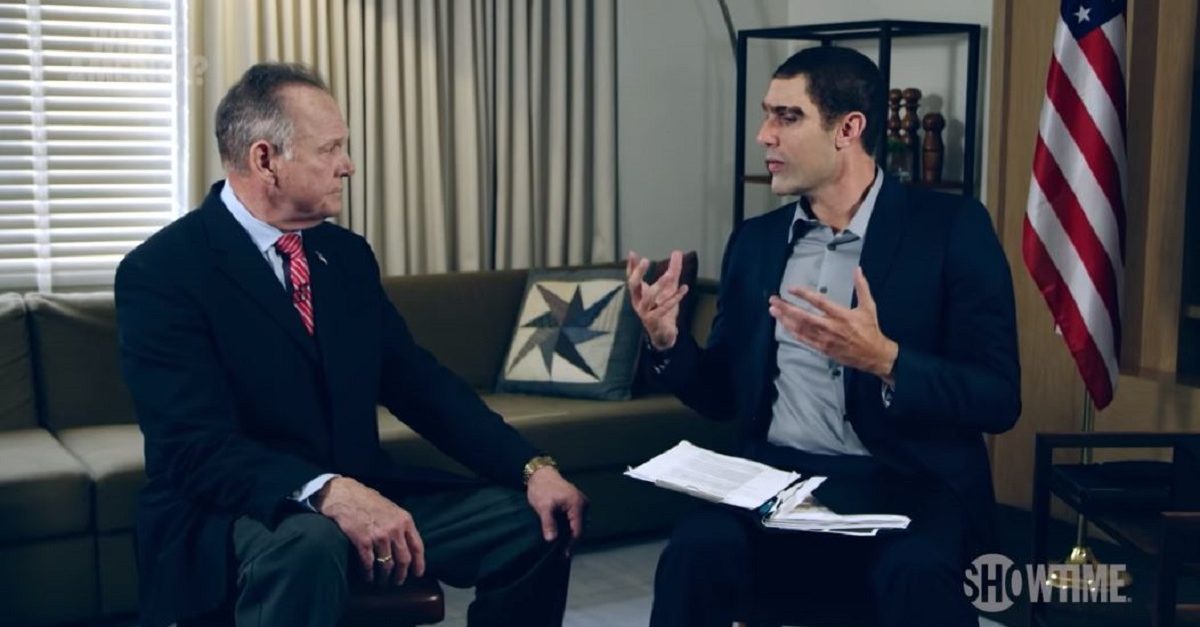
Remember Roy Moore‘s $95 million lawsuit against Sacha Baron Cohen? It’s still winding its way through the legal system. And in a recent filing, Cohen’s attorneys needled the former judge over his legal bona fides and knowledge.
As Law&Crime previously reported, the losing Alabama Senate candidate filed a defamation lawsuit against the controversial comedian and actor in September after a segment on Cohen’s cable series “Who is America?” showed Moore giving an interview with Cohen, who was disguised as a fictitious Israeli counter-terrorism expert named Erran Morad.
On Friday, in a 15-page memo supporting a motion to transfer the case to New York, the defendant’s attorneys note:
Judge Moore is the former Chief Justice of the Supreme Court of the State of Alabama. Such a sophisticated jurist must be well aware of the legal implications of signing a contract.
Seems pretty straightforward, right? Not exactly.
Moore got his start in conservative politics defying court orders regarding the separation of church and state. Later, while serving as chief justice for the Yellowhammer State supreme court, Moore was repeatedly found to have acted in violation of state and federal law–as well as the Alabama Canons of Judicial Ethics.
In 2003, Moore was famously suspended from his position as Chief Justice of the Alabama Supreme Court for refusing to remove a statue of the Ten Commandments from the Alabama Judicial Building–a statue he had personally erected against protests–even after he was ordered to do so by a federal court. Moore responded to his suspension with comments that he would defy court orders in the future, effectively forcing his removal from that office later that year.
Moore then ran for–and won–election as Chief Justice again. He loudly violated the law while in this office again after instructing other judges to continue to enforce the state’s ban on same-sex marriages–even though the Supreme Court had found such bans unconstitutional. He was suspended–but ultimately not removed–from office a second time in 2016. While the case was still pending, Moore simply resigned in order to run for the U.S. Senate seat he eventually lost.
The Friday motion filed by Cohen’s attorneys makes an obvious allusion to Moore’s legal pedigree.
The filing continues:
Here, the short six-paragraph Standard Consent Agreement he signed before appearing in a “television series” provided in no uncertain terms that Judge Moore was “not relying upon any promises or statements made by anyone about the nature of the Program or the identity, behavior or qualifications of any other Participants, cast members, or other persons involved in the Program,” and that he was “signing th[e] agreement with no expectations or understandings concerning the conduct, offensive or otherwise, of anyone involved in this Program.”
Essentially, Cohen’s attorneys are accusing Moore of either not understanding the law or the contract he signed–or maybe both.
“In trying to avoid enforcement of the unambiguous and binding forum selection clause, Plaintiffs completely ignore both the law and the record” the filing continues, “Plaintiffs do not even try to meet [the legal] standard here.”
The filing goes on to note that similar attempts to invalidate consent agreements have been brought against Cohen before–over his earlier “Borat” movie–and that the claims and theories contained in those previous lawsuits also failed.
The motion does note one manor point of difference between the “Borat” lawsuits and Moore’s defamation claims:
Indeed, the only meaningful distinction between this case and the Borat cases is that the plaintiffs in those cases were laypersons, while the signatory of the Consent Agreement in this case is the former Chief Justice of a state Supreme Court.
[image via screengrab/Showtime]